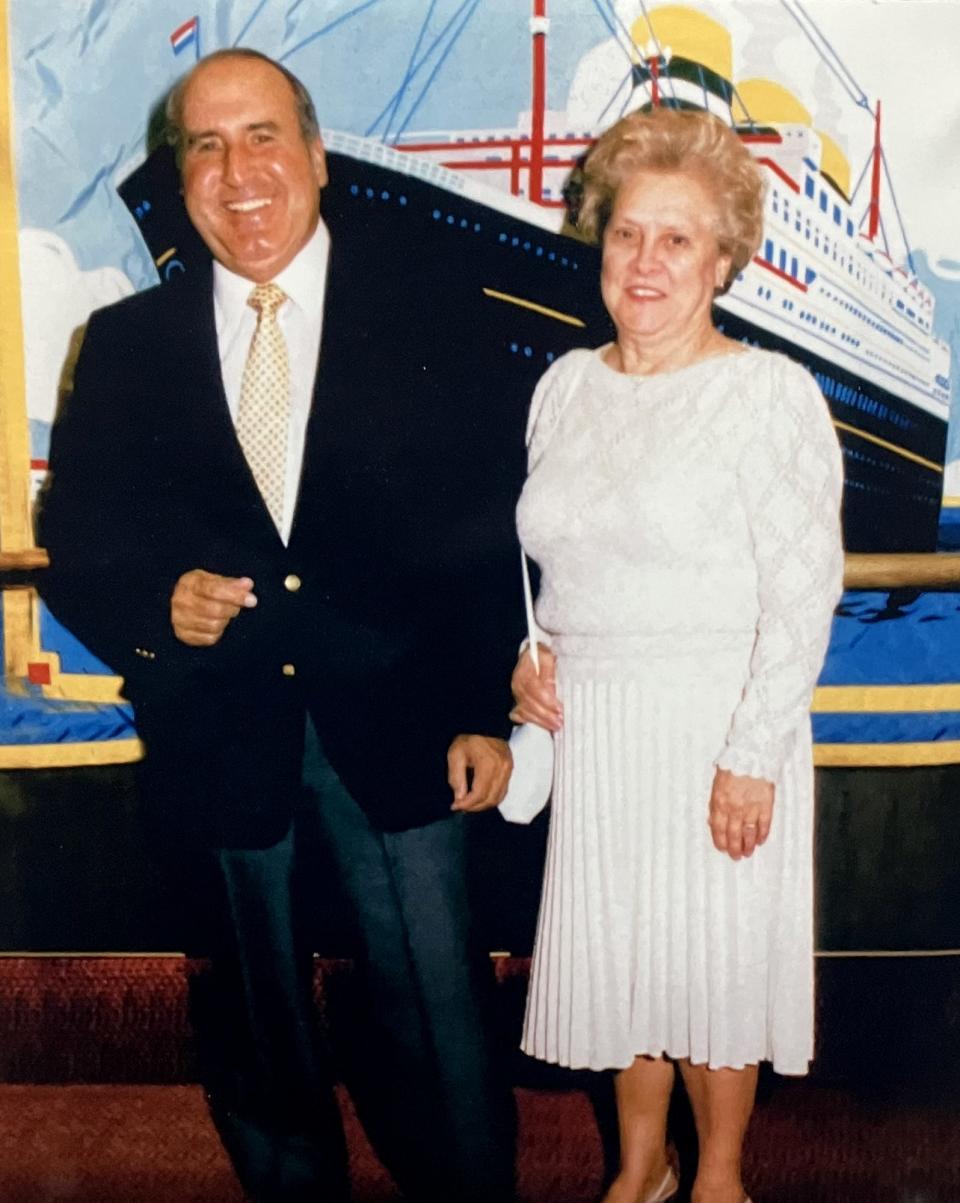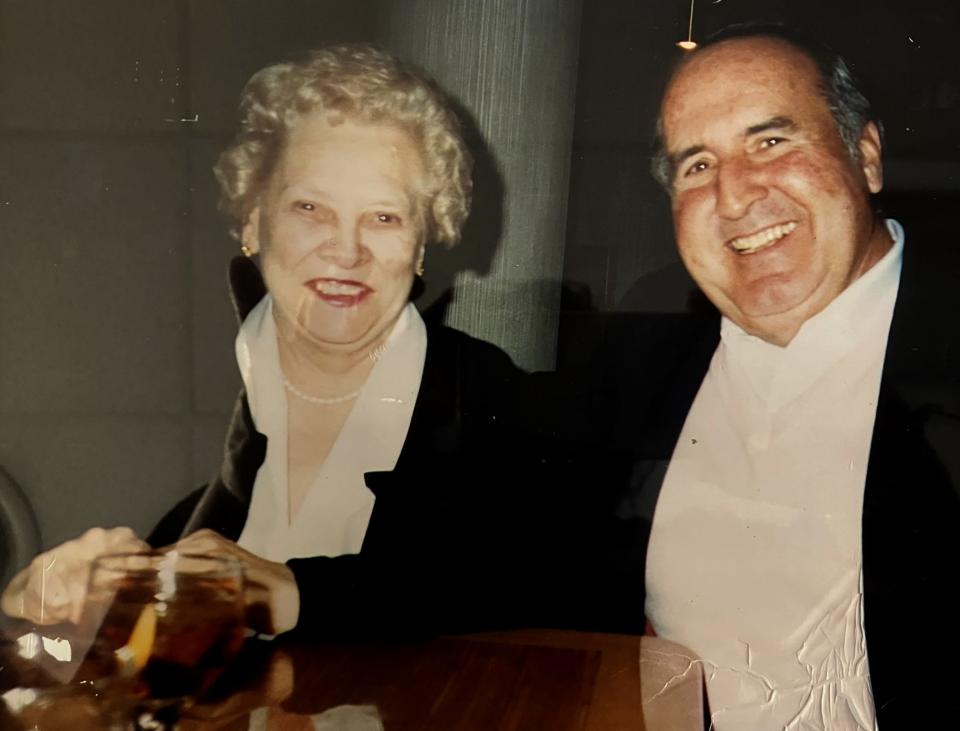Potato chip heiress sues prominent Grosse Pointe lawyer: You used my parents
In his five decades of representing the rich and famous, Grosse Pointe attorney S. Gary Spicer Sr. has twice been accused of mishandling clients' fortunes — and messing with their children's inheritances.
First it was Ernie Harwell's children who made such claims a decade ago, though they went nowhere.
Now it's a potato chip heiress named Barbara Duchene, the sole living heir of a wealthy Grosse Pointe Park foundation. She alleges Spicer kept her in the dark about her inheritance for years, kept her parents' wills a secret from her, mishandled their money, abused their trust and used their charity to enrich himself.

For Spicer, the accusations are a punch to the gut as he maintains he has faithfully served the Duchenes and their lucrative foundation for decades, steering millions to worthy causes and charities of all sorts, with educational institutions being among the top recipients.
But Barbara Duchene doesn't see it that way.
In a heated legal feud unfolding in Wayne County Circuit Court, 68-year-old Duchene, a retired caterer with a multimillion-dollar inheritance, is taking on her late parents' well-connected lawyer and president of the foundation they created in 1996. She alleges, among other things, that Spicer has steered lucrative foundation grants to charities run by his clients, including Detroit Tiger icons Alan Trammell and Kirk Gibson, and once used foundation money to help pay for an Oak Ridge Boys concert at the Grosse Pointe War Memorial.

The Oak Ridge Boys are also Spicer's longtime clients.
Lawsuit cites Spicer overpaid himself, favored friends
Duchene is the heir to the Doris J. Duchene and Donald L. Duchene Sr. Foundation, a 27-year-old Grosse Pointe philanthropic nonprofit that provides grants to organizations of all sorts: Catholic schools and churches. Universities. Soup kitchens. Veterans groups.

Spicer, a longtime trusted family friend and attorney to the Duchenes, has been with the foundation from the get-go. He drafted the foundation's corporate documents, has served as trustee since 1996 and president since 2015. That's the year Donald Duchene died.
It's also the year that Barbara Duchene alleges Spicer started spending "foundation monies extravagantly," paying himself an "excessive" salary and steering her family's money to groups he had a vested interest in, like his grad school alma mater, Wayne State University, the Detroit Athletic Club Foundation, the Kirk Gibson Foundation, and Lance Parrish and Alan Trammell scholarship programs.

Gibson, Parrish and Trammell, all longtime clients of Spicer, never received grants from the foundation before Duchene's father died, states the lawsuit, which alleges the foundation's grant recipients over the last seven years reflect more the interests of Spicer, than those of the Duchene family. It does not allege misspending by the recipients.
'Attorney to the famous and wealthy'
None of this sits well for Barbara Duchene, who alleges in her lawsuit that she was duped by her family's attorney for years, and didn't discover his alleged misdeeds until she started pressing him for information about her parents' estates a few years ago so that she could do her own estate planning.
Barbara Duchene would eventually hire her own attorney. According to the lawsuit, she would learn that Spicer was keeping a lot from her, including the six-figure salaries he was paying himself as president of the foundation.
"Spicer took advantage of his relationship with plaintiff Duchene and her lack of sophistication," states the lawsuit, alleging this was part of a "concerted effort" by Spicer to control and use the foundation to promote himself as "attorney to the famous and wealthy."

While the Duchenes were wealthy — Doris Duchene's father, Ernest Nicolay, was co-founder of the New Era Potato Chip Company, which merged with Frito-Lay and then PepsiCo — they were far from famous. They lived private lives, and quietly gave millions to causes they believed in. Catholic schools and churches were at the top of their list.
When Doris Duchene died in 2001, court records show, her estate was valued at $12.2 million — though Barbara Duchene did not see her mother's will for another 20 years, nor did she know anything about how her mother wanted her fortune to be spent.
According to a series of legal filings in two counties, Barbara Duchene would eventually learn about a $7.5 million pot of money that her mother had set aside in a marital trust and was supposed to be protected, but allegedly wound up in the hands of Spicer. According to court records, Spicer used this money to grow the foundation, pay himself "excessive salaries" and play philanthropist with the Duchene family's money.
"I just want justice for my mom and dad," Duchene wrote the Free Press in an email last week. "This has been beyond heartbreaking for me."
Spicer: 'They had two children who were totally void of working'
The same goes for Spicer.
"It makes me feel horrible that she would do something like this," 81-year-old Spicer said. "This is unkind. It is untrue."
Spicer called Duchene's lawsuit "pathetic" and "totally bogus," maintaining Duchene inherited $5 million from one grandmother, another $5 million from another grandmother and gets $20,000 a month from a trust.

"She didn't take care of any of the investments," Spicer said. "I don't know what she's done with the first $5 million. .... Her parents were the most generous, responsible people. And they had two children who were totally void of working. Her brother went through $10 million ... and he died without a cent."
Barbara Duchene disputed Spicer's assertion, saying she worked several jobs, starting at her family's potato chip company.
As for claims that he hid the parents' wills from Barbara Duchene, Spicer said: "That is totally false; she’s had every opportunity to see both parents' wills and trust, and she hasn’t taken the initiative to ever see them."
As for the lawsuit alleging he abused her parents' trust and their charity to help himself, Spicer said: "It's disgusting what she is trying to do." Spicer said he believes Duchene is trying to gain control of a foundation that her father left him to run.
"I did exactly what he wanted to have done," said Spicer, noting educational scholarships funded by the foundation quadrupled on his watch, and the foundations' assets nearly doubled.
According to court records, since the death of Donald Duchene Sr., when Spicer gained full control, the foundation's assets increased from $3.3 million to $6.3 million in the first five years. Last year, they dipped to $5.7 million.
Judge temporarily appoints receiver to take Spicer's place
"I will stand by it until I die," Spicer said of his record in managing the foundation. "Every single thing that was done was for a good reason. We have not done anything wrong."
Meawhile, Spicer's oversight of the foundation has been temporarily paused.
On Oct. 2, at the request of Barbara Duchene and her lawyers, Wayne County Circuit Judge Annette Berry appointed a receiver to oversee the Duchene family foundation, which temporarily removed Spicer from the organization.
The receiver appointed to oversee the Duchene Foundation is attorney David Findling, who has been a receiver in more than 1,000 cases over the last 30-plus years. He said his focus regarding the Duchene case is to stop the litigation and resolve the matter.
"Sometimes, people are anxious to fight," Findling said. "I’m going to do my best … to bring about a resolution that is satisfactory to all."
Findling declined to comment on whether he has seen anything improper with the handling of the foundation money, stressing that it's premature to weigh in on any allegations and that his goal is to find a resolution for both parties.
The judge appointed the receiver two weeks after Barbara Duchene filed her 46-page lawsuit. The lawsuit argues that money went to organizations that had never before been recipients of her parents' foundation, including several with ties to Spicer. They include:
Between 2017 and 2020, the Kirk Gibson Foundation received $33,000 in grants from the foundation. Gibson is Spicer's client and friend.
In 2018, The Frank Sumbera Foundation received a $33,000 donation. Sumbera is Spicer's client and friend.
The Detroit Athletic Club Foundation received more than $78,000. The DAC foundation was also a recipient of Spicer's own, separate foundation. The lawsuit also alleges Spicer used Duchene Foundation money to pay for his $275-a-month membership at the DAC and tickets for Detroit Tiger games.
In 2018, the Free Press Film Festival received two grants totaling $29,500, and another $3,500 in 2021.
Vanderbilt University, located in Spicer's home state of Tennessee, received $218,900 in foundation money in 2014-21.
In 2021, the foundation gave $2,000 to Michigan State University's S. Gary Spicer Sr. Sports Law Scholarship.
Adrian College, where Spicer earned his undergraduate degree, received $31,615 in 2016, compared with the $18,000 it received over several years when Donald Duchene was alive.
The lawsuit also takes issue with $2.4 million in foundation funds that went to Spicer's law alma mater, Wayne State, starting when he got power of attorney in 2013 through 2021.
Spicer also "dramatically increased" his own salary after Donald Duchene Sr.'s death, the lawsuit states, more than doubling it from $135,000 in 2016 to $280,000 in 2021. Last year, his salary dropped to $170,000.
Spicer's salary increases coincided with the increases in the foundations assets. As they went up, so did his salary. When they went down, his salary dropped, too.
Spicer charges the foundation rent at his office
Spicer has defended his salary, saying: "I was paid less than the market value." He also maintains that his salary was approved by one other board member, though the lawsuit alleges he singlehandedly gave himself raises and handed out grants without conferring with anybody.
According to court, tax and foundation records, the Duchene foundation has a board with three members: Spicer, Barbara Duchene and David Wind. However, Wind, who declined comment, was replaced on the board in 2022 by Trammell, who has since resigned and could not be reached for comment.

The lawsuit also cites as problematic the rent Spicer started charging the foundation, which has always run out of his law office on Kercheval Avenue in Grosse Pointe. According to the lawsuit, for 20 years, the foundation paid no rent.
But starting in 2017, two years after Donald Duchene died, Spicer started charging rent, collecting up to $20,000 a year.
All of this — the grants to clients, salary increases and rent fees — drove Barbara Duchene to court.
"Spicer's self-dealing, breaches of fiduciary duties, violations of law, conflict of interest, lack of disclosure and other misconduct has harmed the foundation," the lawsuit contends.
Spicer, meanwhile, is outraged, and questions why Barbara Duchene is suddenly upset about the $2.7 million that Wayne State has received in foundation money over the last decade. For example, he noted that in 2018, when Wayne State's Athletic Facility was officially named the Doris J. & Donald L. Duchene Sr. Athletic Facility — Barbara Duchene was there.
"Barbara came to the dedication. She was euphoric. She brought her son," said Spicer, who believes the Duchenes would be proud to see their names atop the Wayne State athletic building, and to know that their money has helped fund women's sports, scholarships, batting cages and a turf project at Wayne State.
'It's her family's money, not his'
Barbara Duchene's lawyer says she is entitled to the money, and disputes some of the figures Spicer put out.
"She has no knowledge of a $5 million inheritance from her grandmother," said attorney J. Paul Janes, who takes issue with Spicer commenting on his client's finances. "Why is it his position to make any statement regarding her financial affairs? It's her family's money, not his."
Janes is among multiple attorneys who have been working on Barbara Duchene's behalf for more than a year as she fights to learn more about the handling of her family's fortune. The Wayne County lawsuit is her fourth legal action. Her prior attempts to reopen her father's estate in Grand Traverse County Probate Court have thus far been unsuccessful, with the courts concluding her case is untimely and frivolous.
Her attorney has vowed appeals.
"Mr and Mrs. Duchene — they themselves came from humble beginnings. They knew their children better than anybody, and they knew that they needed assistance and guidance, so they set forth a structured plan for how their inheritance would be passed on for generations," said Janes, stressing his client knows very little about that plan or her inheritance. He said she didn't see her parents' wills until last year, two decades after her mother's death, seven years after her dad's.
According to court records, at the center of this case are two key issues: the discovery of $7. 9 million in Donald Duchene's estate when he died; and the mysterious disappearance of PepsiCo stock from her mother's estate 15 years after her death.
These discoveries were made in the spring of 2022.
Barbara Duchene's two questions
According to court records, on April 13, 2022, after years of requesting information about her parents' finances from Spicer, Spicer provided Barbara Duchene estate tax returns prepared for her mother and father. The tax return for her dad showed he had $7.9 million in assets, which made no sense to Barbara Duchene as it was her mother who had money, not her dad, records show.
Another tax return prepared by Spicer showed that her mother's inherited 161,000-plus shares of PepsiCo stock had dwindled to about 57,000 by the time her husband died.
This has left Barbara Duchene with two questions: How did my father end up with $7.9 million in assets when he died, and what happened to my mother's stocks?
"It is obviously clear that Mr. Spicer and his attorneys are utilizing every possible legal argument to create obstacles for Barbara Duchene from discovering the answer to those two questions," Janes said.
In court documents, Barbara Duchene's lawyers have outlined a theory alleging that the $7.9 million in Don Duchene's estate came from a marital trust that was not to be touched, but only transferred into a family trust once the husband died. The children then would have gotten the money.
But that didn't happen. Instead, probate records state, Spicer convinced Donald Duchene to draft a new will shortly before he died, and tweaked the language that ultimately gave him access to the marital trust, which allegedly wound up benefiting the foundation and Spicer.
Spicer said that scenario is "absolutely not true," maintaining that Duchene Sr. was entitled to all the money he had when he died, and that what Barbara Duchene's lawyers are questioning in their lawsuit is really "very effective estate planning."
Spicer's salary started after Donald Duchene's death
"What they're hung up with is estate planning," Spicer said. "No one paid Mr. Duchene anything that he wasn't entitled to ... everything that he did was agreed upon by Comerica Bank. And the planning that went into both of those wills — I am proud of it completely."
But Barbara Duchene's lawsuit and legal filings in probate court allege that Spicer manipulated her parents' finances to enrich himself.
According to court and foundation records, after Donald Duchene Sr. died, Spicer made at least $3 million over five years by paying himself fees for his roles as trustee, attorney, personal representative and foundation director. His annual salary ranged between $350,000-$400,000, records show, the majority of which was for his role as foundation president.
Foundation tax returns show that in the 15 years before Duchene Sr. died, no salaries were paid to any foundation trustees or employees. And while Spicer was making up to $400,000-plus annually while working for the Duchenes, records show, Barbara Duchene, was making less — about $240,000 a year from her inheritance, or $20,000 a month.
"She made a discovery and has questions about why is it that the attorney seems to have benefited more from her parents than the children and grandchildren," Janes said. "It appears that there’s been a breach of trust to the benefit of the attorney. We just need answers."
Spicer, meanwhile, vows a vigorous legal fight to retain control over a foundation that he believes he knows best.
"I’ve represented this family for 53 years," Spicer said. "Their parents were the nicest people in the world. And we took care of them."
Barbara Duchene's brother, Donald Duchene Jr., died in 2018.
Spicer represents a classic rags-to-riches story, a boy from rural Tennessee who would become the first in his family to get a high school diploma, go to college and become a lawyer for some of the biggest names in sports and entertainment.
His clients have included Harwell, seven of the Detroit Tigers who played on the 1984 World Series team, Conway Twitty, the Oak Ridge Boys and Pam Lewis, former manager of Garth Brooks.

According to his biography published by the Michigan State University College of Law, none of this came easy to Spicer, who worked in a factory and college kitchen to pay his tuition bills at Adrian College, at an automobile factory to get his MBA at Wayne State, and at a bank to put himself through law school at night.
Spicer has raised six children - four of them U.S. Marines, including S. Gary Spicer Jr., who died at 41 of cardiac arrest in 2016.
Over the years, he amassed an impressive resume. He has managed 13 foundations for clients, serves as a board member for five corporations and a trustee of 13 charitable foundations.
“I have been so blessed that I’ve tried to be like an education evangelist,” Spicer said in a 2011 interview with the MSU College of Law. “My grandfather could not read or write. My father died during my first semester in law school. Education was important to them. They would tell me to get the best education because, as they said, ‘no one can take it away from you.’ ”
But now Spicer stands to lose a foundation he spent decades building. He's confident that he will prevail, but worries nonetheless.
Standing in his office on a recent afternoon, surrounded by dozens of photographs of Tigers players, Harwell, the Duchenes and other affluent clients he has represented, he remarked on his legal career in the world of philanthropy.
"We've had it pretty good," he remarked, "except for the two things."
He was referring to Harwell's children and Barbara Duchene.
Tresa Baldas is an award-winning courts and legal issues reporter who received a 2023 Wade H. McCree Advancement of Justice Award by the Michigan Press Association and was named the 2020 Richard Milliman "Michigan" Journalist of the Year by the Michigan Press Association. Contact her at tbaldas@freepress.com.
This article originally appeared on Detroit Free Press: Grosse Pointe lawyer Gary Spicer sued over Duchene Foundation

